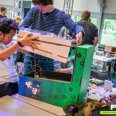The Department of Computer Science of the University of Twente excels in bringing fundamental and applied research in computer science together.
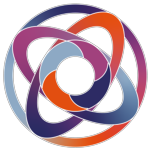 It is especially strong in people-centred, crossover research on smart, safe and sustainable information technology. Our research is organised in different focal areas: Cyber-Physical Systems, Cyber-Social Systems, Data Science, Software Science and Security. The next generation of computer science is outward facing: bringing expertise in harnessing data and computing power for the outside world.
It is especially strong in people-centred, crossover research on smart, safe and sustainable information technology. Our research is organised in different focal areas: Cyber-Physical Systems, Cyber-Social Systems, Data Science, Software Science and Security. The next generation of computer science is outward facing: bringing expertise in harnessing data and computing power for the outside world.
The department therefore collaborates intensively with other research fields within and outside the faculty. Several groups within CS collaborate with the Mathematics and Electrical Engineering departments on topics such as data science, sustainable computing, robotics, and e-Health. Furthermore, there also is close collaboration with researchers that have a basis in the Humanities and Social Sciences. Our research is firmly embedded in the Digital Society Institute (DSI), the Twente University Centre for Cybersecurity Research (TUCCR), the Centre for Networked Systems and Intelligence (EDGE), and the Technical Medical Center (TechMed), which have the goal to foster interdisciplinary research to make an impact on society. We recently started collaborations with other knowledge partners in the Centrum voor Veiligheid en Digitalisering (CVD) and the VU-UT collaboration.
Research
Research in the department is divided into 7 research groups, all contributing to one or more focal areas of the department.
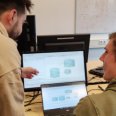 CAES - Computer Architecture for Embedded Systems
CAES - Computer Architecture for Embedded Systems
The CAES group conducts research and education in computer architecture and computing systems with a particular emphasis on embedded systems.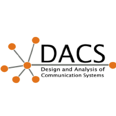 DACS - Design and Analysis of Communication Systems
DACS - Design and Analysis of Communication Systems
The DACS mission is to contribute to the development of the trusted and resilient Internet that is needed by our society. DMB - Data Management & Biometrics
DMB - Data Management & Biometrics
The DMB group works on explainable data science by developing methods for autonomous, reliable and robust gathering, preparation, and analysis of the data, to enable relevant, trustworthy and explainable result. FMT - Formal Methods and Tools
FMT - Formal Methods and Tools
The FMT group develops mathematical methods, high-performance data structures and algorithms, and suitable programming languages for the design of reliable software and data-intensive control systems.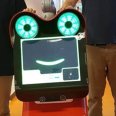 HMI - Human Media Interaction
HMI - Human Media Interaction
The Human Media Interaction (HMI) group does research into multimodal interaction: from brain computer interfaces to social robots. PS - Pervasive Systems
PS - Pervasive Systems
The PS group specialises in networked smart sensing systems, also called Pervasive Systems. SCS - Semantics, Cybersecurity & Services
SCS - Semantics, Cybersecurity & Services
The SCS group realises the vision of meaningful computing within trusted digital environments by advancing the forefront of semantic modeling, enhancing cybersecurity, and innovating service design.
Education
The Computer Science discipline actively participates in various Bachelor and Master programmes at the University of Twente.
Bachelor Programmes
Master Programmes
 Computer Science
Computer Science
Nowadays, we can work, learn, communicate, shop, and play at a click of a button because computer science has made it possible. There is a rising demand for computer science professionals who can tackle tomorrow's digital society challenges. Interaction Technology
Interaction Technology
The I-Tech programme aims at creating impact by envisioning, designing and evaluating cutting edge technology that takes into account the complexity of human lives and environments.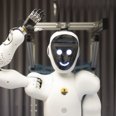 Robotics
Robotics
The days when robots and robotic systems belonged to science fiction are long gone. Today, they play an important role in high-tech industry and are moving into mainstream society. Business Information Technology
Business Information Technology
Through the latest scientific insights, you will gain expertise in areas such as IT architecture, IT-based business models, enterprise security, smart industry, data-driven decision support systems and IT management.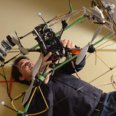 Embedded Systems
Embedded Systems
The design of embedded systems is at the core of technological and industrial progress. Embedded systems are building blocks of medical devices, automobiles, industrial machinery, and GPS systems.
Spotlights
Contact
Partners & Collaborations
 It is especially strong in people-centred, crossover research on smart, safe and sustainable information technology. Our research is organised in different focal areas: Cyber-Physical Systems, Cyber-Social Systems, Data Science, Software Science and Security. The next generation of computer science is outward facing: bringing expertise in harnessing data and computing power for the outside world.
It is especially strong in people-centred, crossover research on smart, safe and sustainable information technology. Our research is organised in different focal areas: Cyber-Physical Systems, Cyber-Social Systems, Data Science, Software Science and Security. The next generation of computer science is outward facing: bringing expertise in harnessing data and computing power for the outside world.








